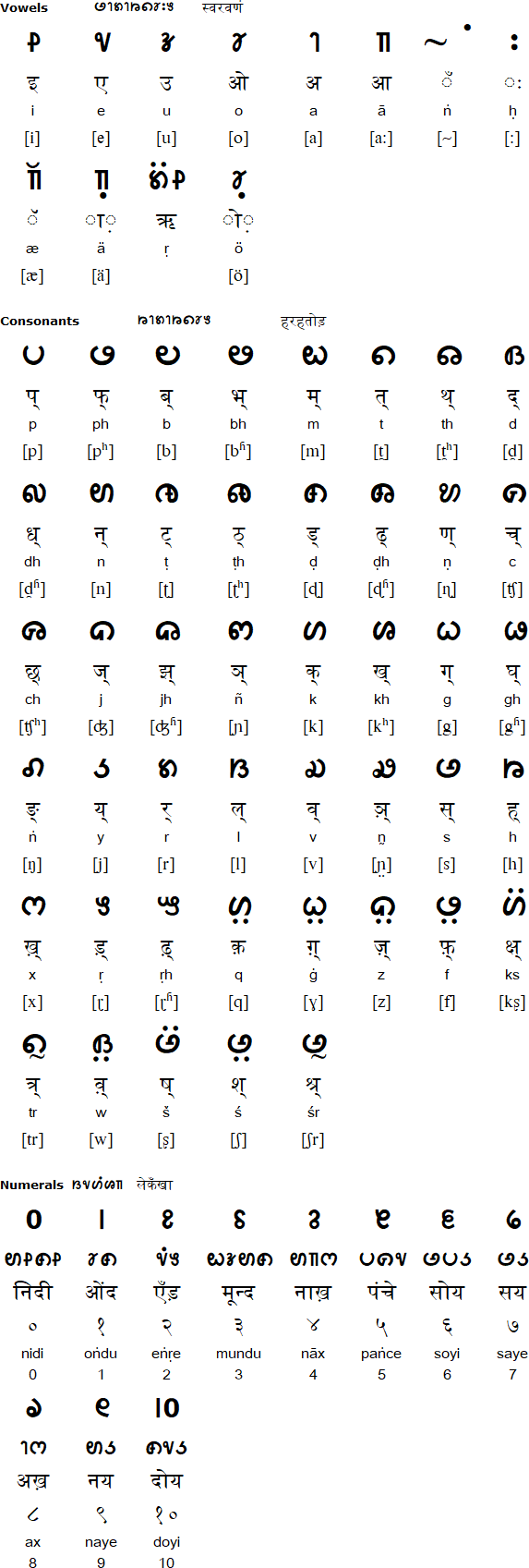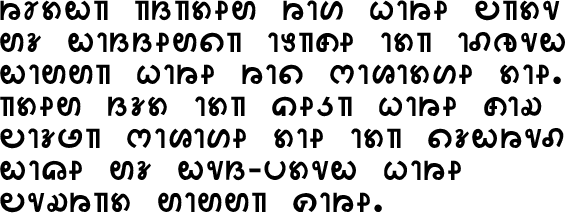The Tolong Siki alphabet was devised by Dr Narayan Oraon, a doctor from Jharkhand, with assistance from Francis Ekka, the former director of the Central Institute of Indian Languages (CIIL) in Mysore; Ramdayal Munda, the former Vice Chancellor of Ranchi University; and Nirmal Minz.
In 1989 Dr Oraon decided to create a new script for his native language, Kurukh, which is usually written with the Devanagari alphabet. His alphabet was published on 15th May 1999, and introduced into some schools later that year. It was formally recognised by the government of Jharkhand in 2007.
Tolong Siki is now promoted by the Kurukh Literary Society, and quite a few books and magazines have been published in it. It also taught in a number of schools.

Download an alphabet chart for Tolong Siki (Excel)

होरमा आलारिन हक गहि बारे नू मल्लीन्ता अज़ादी अरा आण्टेम मन्ना गही हक़ ख़खरकी रई। आरिन लूर अरा जिया गही दव बउसा ख़खकी रई अरा तम्हैं मझी नू मेल-प्रेम गही बेवहार ननना चही।
Hormā ālārin hak gahi bāre nū mallintā azādi arā aṅṭem mannā gahi haq xakharki raī. Ārin lur arā jiyā gahi dav bausā xakhakī raī arā tumhēṅ majhī nū mel-prem gahi bevhār nannā cahī.
All human beings are born free and equal in dignity and rights. They are endowed with reason and conscience and should act towards one another in a spirit of brotherhood.
(Article 1 of the Universal Declaration of Human Rights)
Details supplied by Biswajit Mandal (biswajitmandal[dot]bm90[at]gmail[dot]com)
Information about Tolong Siki
http://tolongsiki.com
https://www.endangeredalphabets.net/alphabets/tolong-siki/
http://www.skyknowledge.com/tolongsiki.htm
http://www.unicode.org/L2/L2010/10106-n3811-tolongsiki.pdf
Ahom, Aima, Arleng, Badagu, Badlit, Basahan, Balinese, Balti-A, Balti-B, Batak, Baybayin, Bengali, Bhaiksuki, Bhujimol, Bilang-bilang, Bima, Blackfoot, Brahmi, Buhid, Burmese, Carrier, Chakma, Cham, Cree, Dehong Dai, Devanagari, Dham Lipi, Dhankari / Sirmauri, Ditema, Dives Akuru, Dogra, Ethiopic, Evēla Akuru, Fox, Fraser, Gond, Goykanadi, Grantha, Gujarati, Gunjala Gondi, Gupta, Gurmukhi, Halbi Lipi, Hanifi, Hanuno'o, Hočąk, Ibalnan, Incung, Inuktitut, Jaunsari Takri, Javanese, Kaithi, Kadamba, Kamarupi, Kannada, Kawi, Kharosthi, Khema, Khe Prih, Khmer, Khojki, Khudabadi, Kirat Rai, Kōchi, Kodava Lipi, Komering, Kulitan, Kurukh Banna, Lampung, Lanna, Lao, Lepcha, Limbu, Lontara/Makasar, Lota Ende, Magar Akkha, Mahajani, Malayalam, Meitei (Modern), Manpuri (Old), Marchen, Meetei Yelhou Mayek, Meroïtic, Masarm Gondi, Modi, Mon, Mongolian Horizontal Square Script, Multani, Nandinagari, Newa, New Tai Lue, Ojibwe, Odia, Ogan, Pahawh Hmong, Pallava, Phags-pa, Purva Licchavi, Qiang / Rma, Ranjana, Rejang (Kaganga), Sasak, Savara, Satera Jontal, Shan, Sharda, Sheek Bakrii Saphaloo, Siddham, Sinhala, Sorang Sompeng, Sourashtra, Soyombo, Sukhothai, Sundanese, Syloti Nagri, Tagbanwa, Tai Noi, Takri, Tamil, Tanchangya (Ka-Pat), Tani, Thaana, Telugu, Thai, Tibetan, Tigalari, Tikamuli, Tocharian, Tolong Siki, Vatteluttu, Warang Citi
Page last modified: 16.03.23
[top]
You can support this site by Buying Me A Coffee, and if you like what you see on this page, you can use the buttons below to share it with people you know.

If you like this site and find it useful, you can support it by making a donation via PayPal or Patreon, or by contributing in other ways. Omniglot is how I make my living.
Note: all links on this site to Amazon.com, Amazon.co.uk
and Amazon.fr
are affiliate links. This means I earn a commission if you click on any of them and buy something. So by clicking on these links you can help to support this site.
[top]